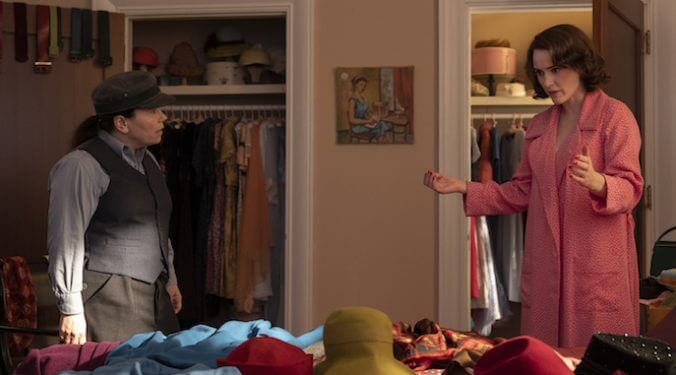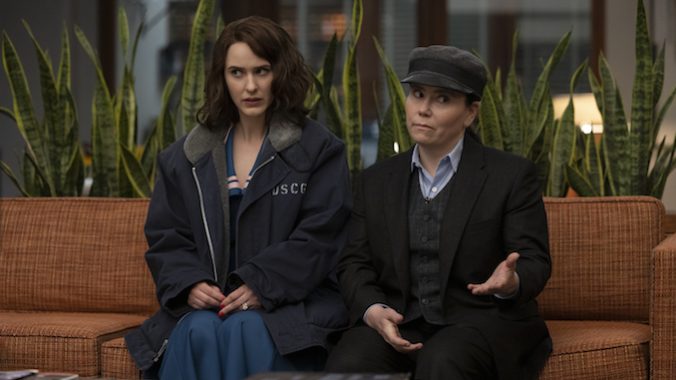Marvelous Mrs. Maisel Season 5, Midge, and Amy Sherman-Palladino’s Bad, Funny Ladies
Photo Courtesy of Amazon Prime Video
Miriam “Midge” Maisel does not tread lightly in life. She stomps in three-inch heels. Can we blame her? Her husband leaves her for another woman. She lives with her two young children in her parents’ apartment and doesn’t have a stable income. But the formidable and Marvelous Mrs. Maisel has let nothing stop her from barreling through comedy clubs… and the lives of others.
Midge has certainly not become easier to empathize with over time, nor does she seem to take into consideration that what happens to her also happens to others. Season 5 is laying bare what has long been implied: Miriam Maisel is not the victim of this story. She’s the antiheroine.
It’s no secret that series creator Amy Sherman-Palladino (ASP) writes tricky and largely flawed female characters, not only in The Marvelous Mrs. Maisel but also in her magnum opus, Gilmore Girls. Midge Maisel’s life choices parallel Rory Gilmore’s at times, especially seeing as neither one has ever cleared a path for themselves without leaving destruction in their wake. They’re both willing to go the distance for their careers, even (or especially) at the expense of others.

This quality truly rears its nasty head for Midge in the show’s fifth and final season. Each episode begins with a time jump to the future, with two of the most poignant flash-forwards coming from Midge’s children, Esther and Ethan, as young adults. Both are detached from their mother, blatantly bitter with how she was selfishly absent for most of their adolescence, and how she has used their lives for comedy.
What is most peculiar about this selfishness is that, while neither Midge (nor her long-time manager Susie) are particularly likable, we can’t help but tune in each week to watch more. Part of this willingness to continue rooting for Susie and Midge, despite their mean spirits, likely has to do with the show’s 1960s setting. We want to see them beat the odds, flawed as they are.
When comparing the Gilmore ladies’ churlishness in a time when everything is becoming easier on the whole “women having equal rights” front, the Mrs. Maisel women start to make more sense. So often, go-getters—and antiheroes—like Midge and Susie are men. For instance, Mad Men’s Don Draper: Also in 1960, he is callously unrelenting in his quest to bolster his status. No one would ask him to go above and beyond just to prove himself. He’s a man. He is allowed to be inflexible without further disrupting his chances at success.
Meanwhile, Susie and Midge find it all the more difficult to rise above gender norms with their tactlessness, as women have traditionally been expected to be gentle and soft-spoken to be listened to at all. Most female viewers can likely relate to dulling parts of their personalities in order to be taken seriously, and so it is gratifying to watch Midge and Susie unabashedly be themselves. Those of us with short tempers can live vicariously through them.
-

-

-

-

-

-

-

-

-

-

-

-

-

-

-

-

-

-

-

-

-

-

-

-

-

-

-

-

-

-

-

-

-

-

-

-

-

-

-

-








































